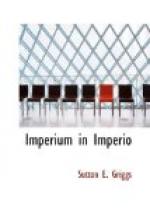During the trial, the jury were allowed to walk about and mingle freely with the people and be thus influenced by the bitter public sentiment against Belton. Men who were in the mob that attempted Belton’s murder were on the jury. In fact, the postmaster was the foreman. Without leaving their seats the jury returned a verdict of guilty in each case and all were sentenced to be hanged.
The prisoners were taken to the New Orleans jail for safe keeping. While incarcerated here awaiting the day of execution, a newspaper reporter of a liberal New Orleans paper called on the prisoners. He was impressed with Belton’s personality and promised to publish any statement that Belton would write. Belton then gave a thorough detailed account of every happening. The story was telegraphed broadcast and aroused sympathetic interest everywhere.
Bernard read an account of it and hastened to his friend’s side in New Orleans. In response to a telegram from Bernard a certain influential democratic senator came to New Orleans. Influence was brought to bear, and though all precedent was violated, the case was manoeuvred to the Supreme Court of the United States. Before this tribunal Bernard made the speech of his life and added to his fame as an orator. Competent judges said that the like of it had not been heard since the days of Daniel Webster.
As he pleaded for his friend and the others accused the judges of the Supreme Court wept scalding tears. Bernard told of Belton’s noble life, his unassuming ways, his pure Christianity. The decision of the lower court was reversed, a change of venue granted, a new trial held and an acquittal secured.
Thus ended the tragic experience that burned all the remaining dross out of Belton’s nature and prepared him for the even more terrible ordeal to follow in after years.
CHAPTER XIII.
Married and yet not married.
Bernard was now at the very acme of fame. He had succeeded in becoming the most noted negro of his day. He felt that the time was not ripe for him to gather up his wealth and honors and lay them, with his heart, at Viola’s feet. One afternoon he invited Viola to go out buggy riding with him, and decided to lay bare his heart to her before their return home. They drove out of Norfolk over Campostella bridge and went far into the country, chatting pleasantly, oblivious of the farm hands preparing the soil for seed sowing; for it was in balmy spring. About eight o’clock they were returning to the city and Bernard felt his veins throbbing; for he had determined to know his fate before he reached Viola’s home. When midway the bridge he pulled his reins and the horse stood still. The dark waters of the small river swept on beneath them. Night had just begun to spread out her sombre wings, bedecked with silent stars. Just in front of them, as they looked out upon the center of the river, the river took a bend which brought a shore directly facing them. A green lawn began from the shore and ran back to be lost in the shadows of the evening. Amid a group of trees, there stood a little hut that looked to be the hut of an old widower, for it appeared neglected, forsaken, sad.




